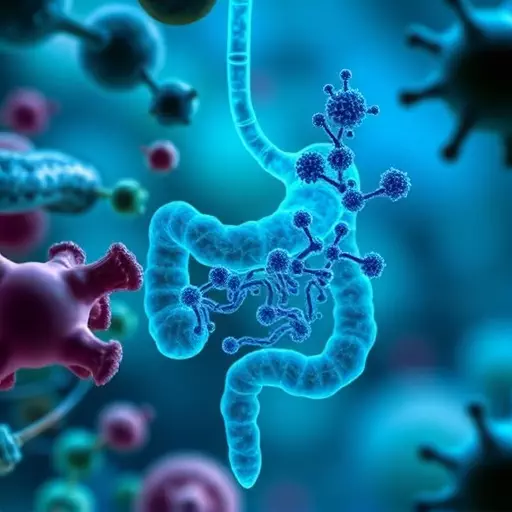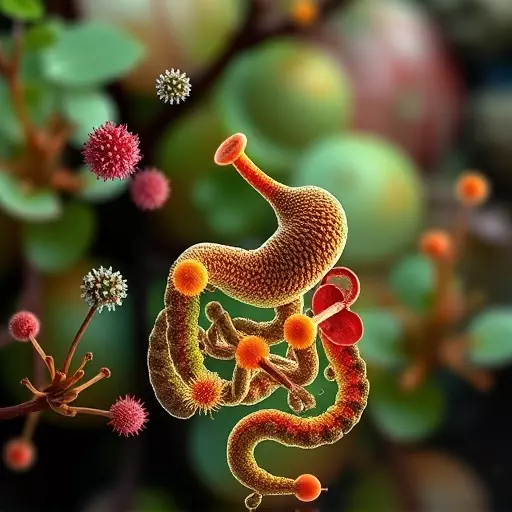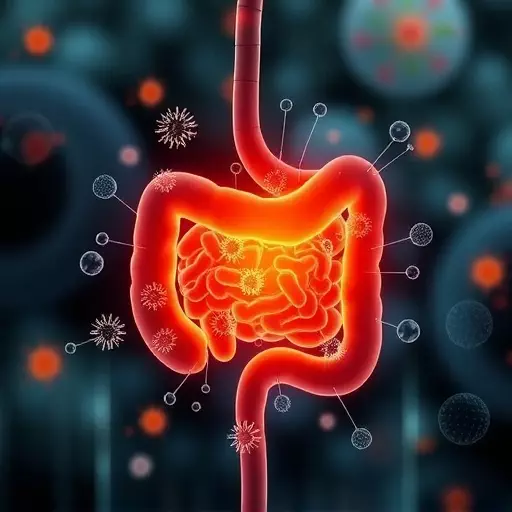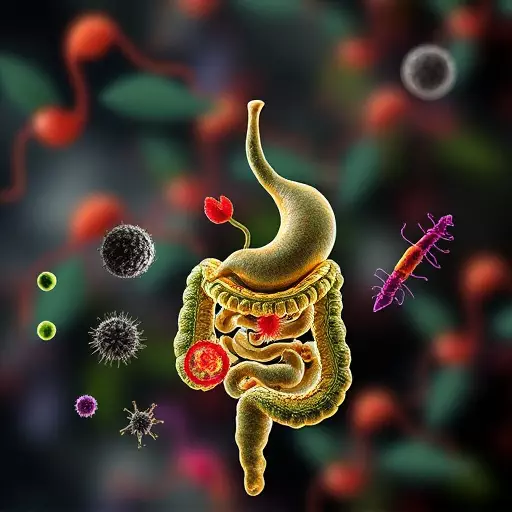Histamine intolerance, caused by imbalanced gut histamine levels due to gut dysbiosis (disrupted microbial ecosystem), significantly impacts daily life. Functional medicine in Toledo offers a holistic approach, addressing root causes like food sensitivities and environmental allergens. It focuses on restoring balance in gut dysbiosis and promoting microbial diversity as key to systemic health. Effective management involves dietary modifications, specific probiotics, and comprehensive immune system support. Restoring microbial diversity is crucial for achieving overall wellness by improving digestion, reducing inflammation, and addressing the gut-brain axis connection.
“Unraveling the complexities of histamine intolerance and gut issues? This comprehensive guide explores innovative solutions through functional medicine. In today’s world, many face challenges like digestive disorders and sensitivity to histamine, impacting overall well-being.
Our article delves into the root causes, from symptoms to gut-brain connections. We uncover the power of functional medicine in Toledo for restoring balance in gut dysbiosis. Learn how microbial diversity plays a pivotal role in achieving systemic health. Discover dietary strategies and holistic treatments tailored to manage histamine intolerance effectively.”
- Understanding Histamine Intolerance: Symptoms and Causes
- The Gut-Brain Connection: How Gut Issues Affect Overall Health
- Functional Medicine Approach to Restoring Balance in Gut Dysbiosis
- Microbial Diversity: Nurturing a Healthy Gut Ecosystem
- Dietary Strategies for Managing Histamine Intolerance
- Holistic Treatments: Exploring Functional Medicine Options in Toledo
Understanding Histamine Intolerance: Symptoms and Causes

Histamine intolerance is a condition that affects many individuals, often leading to a range of uncomfortable symptoms and impacting overall quality of life. Understanding this disorder is the first step towards effective management, which is where functional medicine in Toledo can offer valuable insights and solutions. Symptoms may include skin rashes, hives, itching, digestive issues like diarrhea or constipation, and respiratory problems such as nasal congestion or asthma-like attacks. These symptoms arise when the body’s histamine levels become imbalanced, often due to an overproduction or impaired breakdown of histamine.
The root causes of histamine intolerance are multifaceted, involving both genetic predisposition and environmental triggers. One key factor is gut dysbiosis, where the microbial diversity in our intestines becomes disrupted. This imbalance can lead to excessive histamine production by certain gut bacteria. Restoring balance in gut dysbiosis with functional medicine approaches, such as dietary modifications and specific probiotics, has been shown to be beneficial. Additionally, addressing underlying issues like food sensitivities, environmental allergens, or even immune system disorders, is crucial in managing histamine intolerance holistically, focusing on systemic health, where microbial diversity plays a pivotal role.
The Gut-Brain Connection: How Gut Issues Affect Overall Health

The gut-brain connection is a bi-directional relationship that highlights just how integral our digestive system is to overall health and well-being. When gut issues arise, such as those experienced by individuals with histamine intolerance, it can lead to a cascade of effects impacting not only the gastrointestinal tract but also the brain and other systems in the body. This intricate connection means that restoring balance in gut dysbiosis is not merely about soothing digestive symptoms; it’s about achieving systemic health.
Functional medicine in Toledo offers a holistic approach to addressing these issues, focusing on identifying and treating the root causes of gut problems rather than just managing symptoms. By emphasizing microbial diversity as a key to systemic health, functional medicine practitioners aim to cultivate a balanced and diverse microbiome, which is essential for proper digestion, immune function, and even cognitive performance. Through personalized protocols that may include dietary modifications, probiotic supplements, and other evidence-based interventions, restoring balance in gut dysbiosis can help alleviate histamine intolerance symptoms and foster overall vitality.
Functional Medicine Approach to Restoring Balance in Gut Dysbiosis

At its core, functional medicine takes a holistic approach to healing, recognizing that gut health is intricately linked to overall wellness. When it comes to managing histamine intolerance and associated gut issues, this method becomes particularly powerful. The goal isn’t just to treat symptoms but to identify and address the root causes, focusing on restoring balance in the gut microbiota or dysbiosis.
Functional Medicine practitioners in Toledo often emphasize microbial diversity as a key indicator of systemic health. By promoting a diverse ecosystem within the gut, they aim to support a robust immune system, improve digestion, and reduce inflammation. This involves personalized strategies such as dietary modifications, targeted supplements, and even advanced treatments like probiotic therapy to reintroduce beneficial bacteria and restore harmony in the gut.
Microbial Diversity: Nurturing a Healthy Gut Ecosystem

In the quest for managing histamine intolerance and gut issues, understanding the intricate relationship between microbial diversity and overall health is pivotal. Functional medicine in Toledo emphasizes that a thriving gut ecosystem, teeming with diverse microorganisms, is essential to systemic well-being. When the delicate balance within our intestines is disrupted, leading to what’s commonly known as gut dysbiosis, it can have far-reaching consequences, impacting not just digestion but also various body systems.
Restoring this balance is key to addressing gut issues and intolerances like histamine sensitivity. Functional medicine practitioners employ strategies to nurture microbial diversity, promoting the growth of beneficial bacteria while mitigating harmful pathogens. This holistic approach involves dietary modifications, targeted supplements, and sometimes even fecal microbiota transplantation (FMT) as part of a personalized treatment plan. By viewing the gut as the body’s second brain, functional medicine in Toledo takes a comprehensive stance, acknowledging that microbial diversity is not just about digestion but is intrinsically linked to our overall health and vitality.
Dietary Strategies for Managing Histamine Intolerance

Histamine intolerance can be managed through tailored dietary strategies that focus on reducing histamine levels and supporting gut health. A functional medicine approach in Toledo emphasizes understanding individual triggers and implementing specific dietary changes. Patients are encouraged to adopt an anti-inflammatory diet, avoiding foods rich in histamine or substances that stimulate its release. This includes limiting fermented foods, citrus fruits, certain dairy products, and processed meats.
Restoring balance in gut dysbiosis is a key aspect of this process, as microbial diversity plays a vital role in systemic health. Functional medicine practitioners may recommend proactive steps such as increasing fiber intake, incorporating prebiotics and probiotics into the diet, and promoting regular intestinal cleansing to support a healthy gut microbiome. These strategies not only alleviate symptoms but also contribute to long-term wellness by addressing the root cause of histamine intolerance and related gut issues.
Holistic Treatments: Exploring Functional Medicine Options in Toledo

In Toledo, functional medicine offers a holistic approach to managing histamine intolerance and gut issues, addressing root causes rather than just symptoms. This personalized treatment modality focuses on restoring balance in gut dysbiosis, a condition characterized by an imbalance in microbial diversity within the gastrointestinal tract. By cultivating a diverse and healthy microbiome, functional medicine aims to support systemic health and overall well-being.
Functional medicine practitioners in Toledo leverage advanced testing and assessment tools to identify specific imbalances and create tailored treatment plans. These plans may include dietary modifications aimed at reducing histamine intake, implementing gut-friendly bacteria through probiotics, prebiotics, and fermented foods, as well as addressing underlying stress factors that can exacerbate gut issues. The ultimate goal is to empower individuals with the knowledge and tools necessary to take control of their health and achieve lasting relief from histamine intolerance and gut problems.
